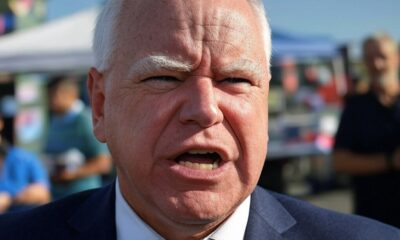News
Republicans Propose Tax on International Money Transfers

In a bold move to safeguard American interests and uphold the principles of national sovereignty, Republican lawmakers are considering a strategic initiative to tax the billions of dollars sent abroad annually as remittances. This proposal aligns seamlessly with the values of faith, family, and freedom that are cherished by many Americans, particularly those who hold conservative views.
Every year, vast sums of money are sent from the United States to other countries by workers residing within our borders, both legally and illegally. These remittances significantly bolster the economies of countries like Mexico and those in Northern Central America. For instance, the World Bank reports that remittances constitute about 17% of the GDP in Northern Central America and 4.5% of Mexico’s GDP.
However, this financial outflow has sparked a necessary debate about the impact on the American economy and national security. The Republican proposal aims to impose a 5% tax on funds sent abroad by non-citizens or foreign nationals. This measure is projected to generate over $22 billion in revenue over a decade, funds that could be pivotal in extending the tax cuts that have already benefited countless American families.
Mexican President Claudia Sheinbaum has criticized the proposal, labeling it as “arbitrary and unjust.” Yet, from a conservative perspective, this initiative is far from unjust. It represents a fair and strategic approach to ensuring that those who benefit from the American economy also contribute to its sustainability and security.
Rep. Kevin Hern of Oklahoma encapsulated the dual benefits of this proposal, stating, “It’s a two-fold win: taxing remittances will help slow down the cash flow to cartels and will also create a new revenue source we can use to build the wall and secure our border.” This approach not only addresses economic concerns but also tackles the pressing issues of drug trafficking and illegal immigration, which threaten the safety and stability of American families.
The surge in remittances to countries like Guatemala, El Salvador, and Honduras, with increases of up to 20% recently, underscores the urgency of this measure. By reducing the financial “pull” factor that attracts illegal immigration, this tax plan serves as a robust tool in preserving the integrity of our borders.
In essence, this proposal is a testament to the commitment of Republican leaders to prioritize the well-being of American citizens. It reflects a deep understanding of the need for individual responsibility and the importance of biblical principles in shaping a society that values hard work, fairness, and national pride. By supporting this initiative, we take a stand for a future where faith, family, and freedom are protected and celebrated.
Let us know what you think, please share your thoughts in the comments below.
News
Men Join the Fight for Reproductive Rights

In a recent initiative, Planned Parenthood has launched the “Bros for Repro” campaign, encouraging men to support abortion rights. This campaign highlights how the organization seeks to engage men in discussions about reproductive rights, rather than focusing solely on women’s perspectives.
Planned Parenthood, a major healthcare provider, is advocating for a constitutional amendment in Virginia that would allow for abortion access throughout pregnancy. The Virginia League for Planned Parenthood (VLPP) is working to gather support for this amendment, emphasizing the importance of reproductive freedom and choice.
The “Bros for Repro” campaign aims to redefine allyship by encouraging men to support reproductive rights. Josh Cole, a spokesperson for the campaign, states, “Freedom is sacred. And real love honors choice.” This perspective emphasizes the importance of individual freedom and the belief in supporting personal decisions.
The response from various groups to this campaign has been mixed. Some express concern over the lack of opposition from certain political and religious groups, while others highlight the need for more comprehensive discussions around reproductive rights and responsibilities.
In 2020, changes in Virginia’s legislation led to the repeal of the Women’s Right to Know Bill, which previously mandated certain informational requirements for women considering abortion. Planned Parenthood advocates for informed reproductive choices and emphasizes the importance of access to comprehensive information and resources.
The ongoing debate around reproductive rights continues to reveal differing perspectives on issues of equality and personal freedom. Advocates for reproductive rights argue for the importance of supporting women and families through access to necessary resources and healthcare.
Supporters of reproductive rights believe that true allyship involves standing with women and families during challenging times, offering support and understanding. In Virginia, there are numerous resources available for those facing unexpected pregnancies, providing medical services and material support.
Encouraging responsible and informed decision-making is crucial. By promoting understanding and support, society can better uphold values of compassion and freedom, ensuring that individuals have the resources they need to make informed choices about their lives and futures.
Let us know what you think, please share your thoughts in the comments below.
News
Miraculous Poolside Encounter Reveals Divine Presence

In a world where faith and family are the bedrock of our values, stories like that of six-year-old DJ from Louisiana remind us of the divine presence that guides and protects us. On what was meant to be a joyful Fourth of July celebration, DJ’s family experienced a harrowing event that turned into a profound testament to the power of prayer and the reality of God’s presence.
The incident unfolded at the Paragon Casino Resort in Marksville, Louisiana. DJ, who has always been apprehensive around water, found himself in a life-threatening situation when he unexpectedly ended up in the pool. His mother, Krista Parker, and his stepfather acted swiftly, performing CPR in a desperate attempt to revive him.
As they worked tirelessly, Krista’s faith shone through her heartfelt prayer:
“Lord, cover my baby with your blood in the name of Jesus. Lord, please give me my baby back.”
In a miraculous turn of events, DJ began to show signs of life, and emergency crews soon arrived to take over. But it was DJ’s account of what happened during those terrifying moments that truly captured the hearts of many.
“He looked at me and my husband. He said, ‘No, Daddy, no momma. God is real. I saw him. I saw him and uncle Quimaine.'”
This powerful testimony resonated with countless individuals on social media, reinforcing the belief that God’s hand is ever-present in our lives. One person exclaimed, “Glory to God Most High! God is definitely real. What a powerful testimony!” Another echoed, “God is so good. Thank you Lord for returning this child.”
DJ emerged from the ordeal with only minor physical repercussions, but the spiritual impact on his family was profound. Krista Parker now urges parents to be prepared for emergencies by becoming CPR certified, and she reflects on the importance of safety measures like life vests.
Yet, beyond the physical precautions, Krista emphasizes the significance of DJ’s spiritual revelation. She shares her son’s description of God as being made up of all colors, a reminder of the unity and love that should bind us together. Krista’s realization is a call to action:
“We need to love one another and be a unit and God is real. Get closer to God. You seek him, you shall receive.”
In a society often distracted by material concerns, DJ’s experience serves as a poignant reminder of the divine truths that underpin our lives. As we navigate the complexities of the modern world, let us hold fast to our faith, cherish our families, and uphold the freedoms that allow us to live according to our values.
Let us know what you think, please share your thoughts in the comments below.
News
Hulk Hogan’s Surprising Journey Beyond the Wrestling Ring

In a world that often celebrates fame and fortune over faith and humility, the life of Terry Bollea, known to many as the legendary wrestler Hulk Hogan, stands as a testament to the transformative power of faith in Jesus Christ. Pastor Aaron Filippone of Indian Rocks Baptist Church in Largo, Florida, recently shared a heartfelt tribute to his late congregant, highlighting Bollea’s journey of faith and his unwavering commitment to living out Christian values.
Pastor Filippone fondly remembered Bollea as “a humble, joyful, Jesus-loving man who lived out his faith every day.” This powerful statement is a reminder of the profound impact that a life rooted in faith can have, not only on the individual but on the community around them. Bollea’s life was a living example of the biblical principle found in Romans 10:9, which assures us that “if you confess with your mouth that Jesus is Lord and believe in your heart that God raised him from the dead, you will be saved.”
Despite his fame as Hulk Hogan, Bollea chose to walk a path of humility and grace. He worshipped alongside his fellow congregants, shoulder to shoulder with the people he loved, rather than seeking the spotlight. Pastor Filippone emphasized that Bollea “didn’t want the spotlight or the green room. He wanted to be where God was moving.” This choice speaks volumes about his character and his desire to prioritize his faith over worldly accolades.
Bollea’s journey was not without its challenges. He faced public scrutiny and personal trials, but he never shied away from acknowledging his past. As Pastor Filippone noted, “Terry wasn’t a perfect man — he never claimed to be. He had a past, and he made mistakes. But Terry was a Jesus man, and that’s the beauty of the Gospel.” This acknowledgment of imperfection is a powerful reminder that God’s grace is available to all who seek it, regardless of their past.
Bollea’s commitment to sharing the Gospel was evident in his everyday interactions. He often wore a shirt emblazoned with the Bible verse John 3:16, and he invited friends to church so they could experience the hope and love he found in Jesus Christ. Pastor Filippone praised Bollea for making time for people, engaging in “handshakes, hugs, and conversations that pointed hearts to Christ.”
In his tribute, Pastor Filippone encouraged readers to seek the same kind of faith that Bollea had, reminding us that “Jesus offers hope, forgiveness, and eternal life to anyone who believes.” This call to faith is a powerful invitation to embrace the transformative love of Christ and to live boldly for Him, just as Bollea did.
As we reflect on Bollea’s life, we are reminded of the importance of faith, family, and freedom in shaping a values-driven society. His legacy is a testament to the power of living a life grounded in biblical principles and the impact that such a life can have on those around us. In a world that often prioritizes fleeting fame, Bollea’s story is a beacon of hope and a reminder of the eternal significance of faith in Jesus Christ.
Let us know what you think, please share your thoughts in the comments below.
-

 Self-Reliance5 months ago
Self-Reliance5 months agoTrump’s Bold Move Uncovers Massive Social Security Fraud
-

 News6 months ago
News6 months agoGovernor Walz’s Rhetoric Sparks National Controversy
-

 Faith5 months ago
Faith5 months agoNew Clues Emerge in Noah’s Ark Mystery
-

 Family5 months ago
Family5 months agoTexas Lawmaker Targets Furries in Schools
-

 News5 months ago
News5 months agoMel Gibson’s ‘The Passion of the Christ’ Sequel Title Announced
-

 Freedom5 months ago
Freedom5 months agoMaine Lawmaker Challenges Sports Fairness Controversy
-

 Family3 months ago
Family3 months agoCanada’s Controversial Policy Sparks Ethical Debate
-

 Faith4 months ago
Faith4 months agoMassive California Baptism Bash Shatters Records, Ignites Thousands!

